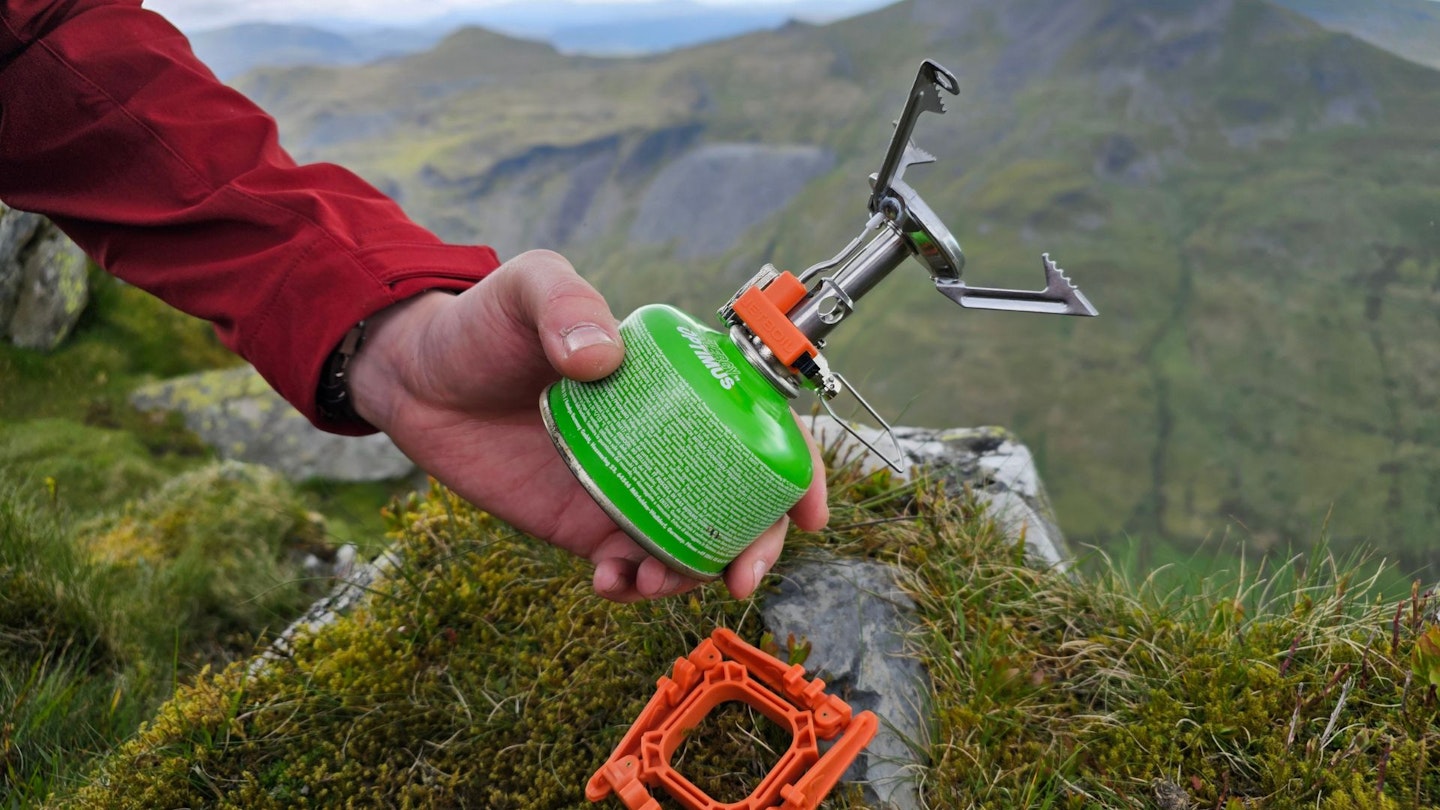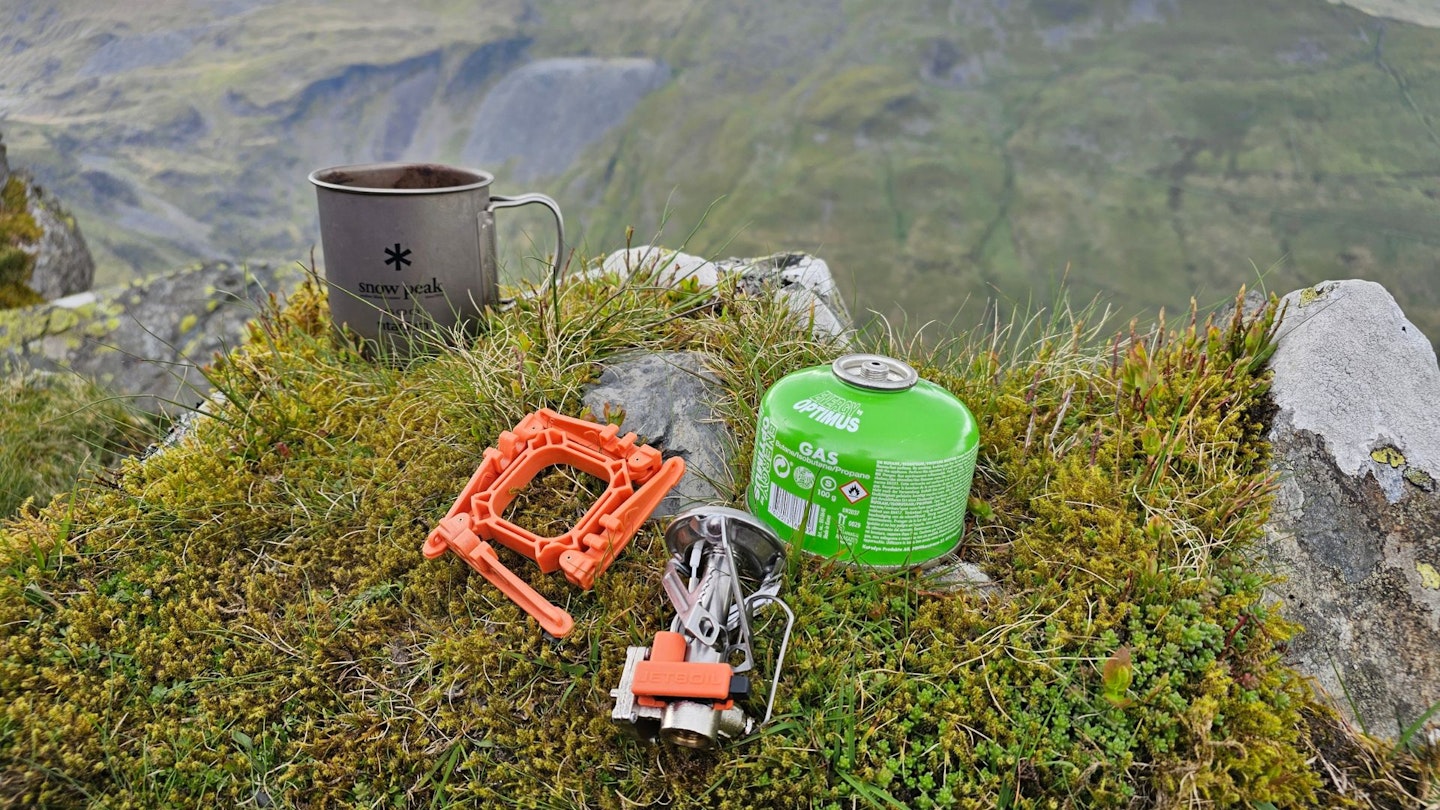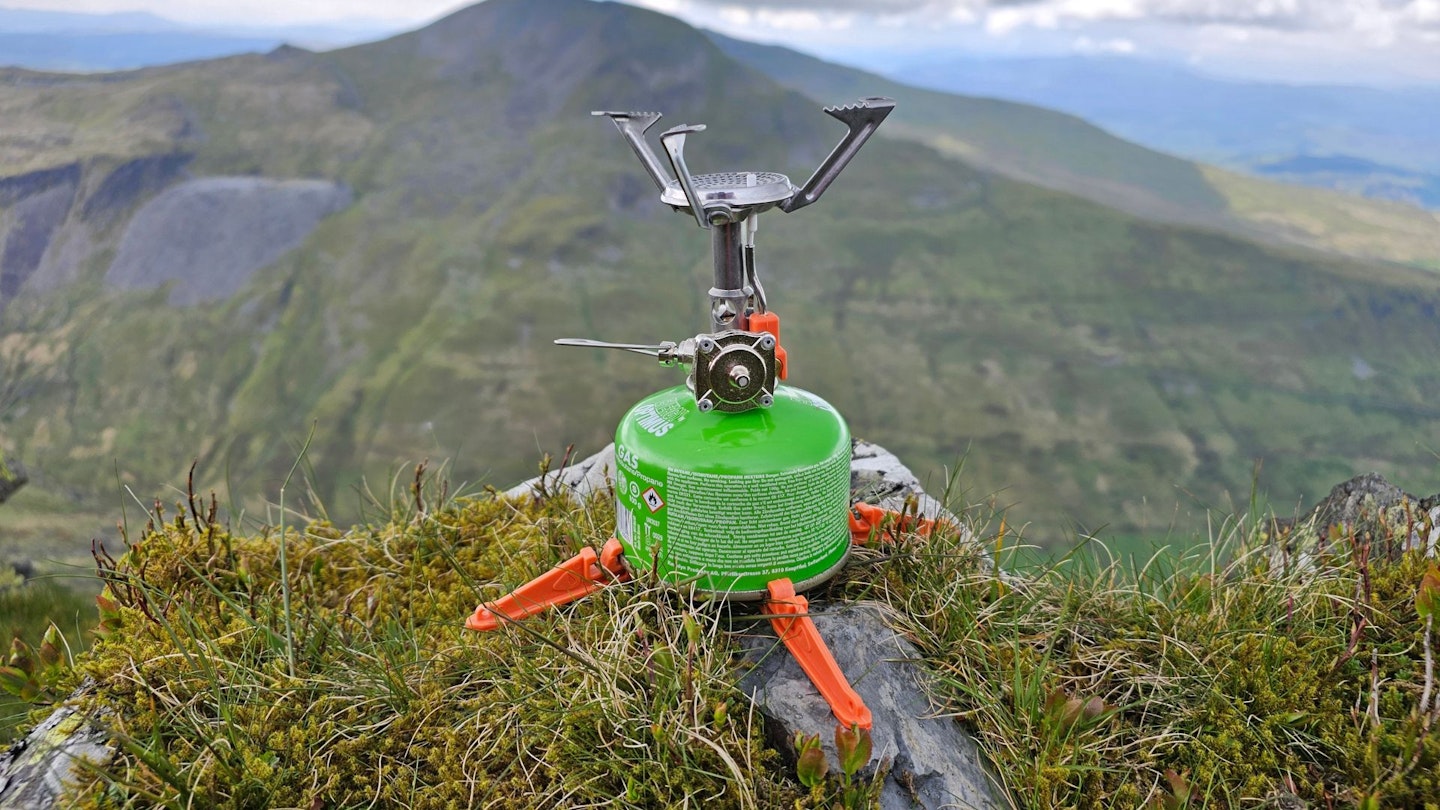JetBoil is a brand that has built its reputation on the strengths of its so-called ‘PCS’ or personal cooking systems, otherwise known as integrated or all-in-one stoves. These feature a screw-in burner that sits on top of a gas canister, just like a conventional backpacking stove, but in addition they have a locking pot with a heat exchanger base, wrapped in a thermally insulated sleeve. This maximises efficiency for super-fast boil times. Bestselling examples include the JetBoil Flash, Zip and MiniMo.
In contrast, the MightyMo is a simple screw-in, canister top stove. In other words, it’s return to the classic backpacking stove design. You don’t get a pot and the burner head features folding pot supports, though it does boast a built-in regulator and piezo ignition. All well and good, but why has the brand moved away from the designs that made them famous?
Basically, the decision seems to come from a desire to create a stove that will appeal to backpackers who are looking for a lighter and more compact option than any of JetBoil’s other stoves. It also competes more directly with the multitude of other screw-in stoves on the market – but of course, that means the MightyMo is going to have to be an impressive bit of kit to sway buyers from well-established rivals.
 LFTO
LFTOPros
- Fantastic simmer control
- Quick boil times
- Gas regulator ensures steady gas supply
Cons
- Not the most stable
- Susceptible to wind
| Weight | 97g (138g packed in storage bag) |
| Packed size | 7.5 x 6cm |
| Boil time | 2 minutes 49 seconds (0.5L of water at ambient 17°C) |
| Power output | 3,000W (10,236 BTU/hr) |
Design

JetBoil hasn’t exactly reinvented the wheel here. Then again, if it ain’t broke, don’t fix it. Either way, the MightyMo is a fairly standard-looking screw-in style stove designed to sit on top of a standard EN417 threaded gas canister. When set up, the total stove height from the top of the canister to the base of your cooking pot is 10cm. This means it sits a bit higher than rivals like the MSR Pocket Rocket and the SOTO Windmaster, which is a negative in terms of overall stability, weight distribution and susceptibility to wind.
The stove has three sturdy fold-out pot supports, with a total diameter of 12cm. This is the perfect size should you happen to own a 1.5-litre JetBoil Fluxring cooking pot, as it means the inner lip of the pot sits neatly on the flat outside edges of the MightyMo’s pot supports. A series of serrated teeth on each of the arms help to grip the bases of other size pots too, ensuring you can also use other types of cookware with the stove. Still, unless you’re using JetBoil’s own cookware, we’d say that overall stability isn’t quite as good as some rival stoves.
The burner head measures 40mm in diameter and is a concave shape, which helps to prevent hotspots in the middle. The burner has a rated power output of 3,000W (10,000+ BTU/hr), which puts this up there with the most powerful screw-in stoves on the market.
In terms of build quality, the MightyMo seems solid enough, although the casting of some metal components doesn’t seem to be as refined as some other stoves we tested. It’s not as elegantly engineered as the SOTO Windmaster or MSR Pocket Rocket Deluxe, for example.
The stove is bundled with a little cloth storage bag and a fold out plastic stand that attaches to various size gas canisters in order to improve overall stability. This is a nice touch – other brands also make these stands, but they rarely include them with their stoves (you have to buy them separately).
Performance

The ability to turn this stove to a gentle simmer is great for more precise cooking tasks, but if you just want to crank this stove up to max and boil water quickly, then the MightyMo is also up to the task. So, it’s a pretty versatile beast in that regard. Our controlled boil test gave a boil time of 2 minutes and 49 seconds for half a litre of water – only 20 seconds or so behind the SOTO Windmaster and 12 seconds behind the MSR Pocket Rocket Deluxe.
Having said that, on test in the mountains of Snowdonia, we found it necessary to keep the MightyMo sheltered from the wind. A sudden gust can blow out the flame, and wind resistance isn’t as good as rivals like the MSR Pocket Rocket Deluxe or SOTO Windmaster. We think this is partly because it’s a bit taller than either of those, and partly because the design of the folding supports means the pot sits a lot higher above the flame. The MightyMo also lacks the protective lip around the edge of the burner that seems to make such a difference to fending off the wind.
The MightyMo doesn’t struggle too much in the cold though, at least if you’re using a 4-season isobutane/propane gas canister. We reckon that’s down to the built-in regulator, which gives more consistent performance in lower temperatures. It’s a real benefit if camping on chillier nights or at higher elevations.
Weight and packed size

The stove itself weighed 97g on our scales (Jetboil say 95g). Adding the fabric storage bag and the folding canister support results in a total packed weight of 138g. That's 40g or so heavier than the packed weight of the SOTO Windmaster and the MSR Pocket Rocket Deluxe, two comparable rivals.
There are ultralight screw-in stoves that are lighter still, including several models on the market that come in at under 50g. But these tend to lack in-built ignition and regulators, which means less consistent cooking performance and the need to carry a lighter, firesteel or some other form of ignition. They also have smaller pot supports, which makes them less stable and unable to take larger cooking pots or pans. In contrast, the MightyMo is much more versatile.
The packed dimensions of the stove measure about 7.5cm x 6cm, which is very compact. It nests easily in a solo cooking pot or mug.
Ease of use

All canister-top stoves can feel a bit top-heavy, particularly when using bigger pans or the smallest 100g gas canisters. As such, we really liked the folding canister support that comes with the MightyMo, as it makes things a lot less unwieldy. Having said that, most brands do these stands now, and they only cost a few quid, so that’s hardly a reason to buy a MightyMo.
Conversely, as we said earlier, unless you’re using JetBoil’s own Fluxring cooking pot, this stove doesn’t feel quite as stable as some other stoves. The pot supports don’t seem to grip as well, which means there is a danger that the pot can sometimes slide around or even slip off the stove altogether. We think this might be because the teeth are smaller and less grippy, and there is also a small flat piece of metal on the end of each arm that possibly decreases the friction under the pan.

The burner features an in-built regulator as well as integrated piezo ignition. Regulators help to ensure a constant flow of gas to the burner head, especially as the gas canister empties, which makes this an important feature if you expect to be using the stove in colder weather. The ignition does leave some parts exposed though, including the thin wire sparker. This looks liable to getting brittle over time, which might mean it will eventually snap off. This was a common complaint with earlier generations of JetBoil stoves, and although the brand has improved the design over time, it still doesn’t seem to be as good a solution as the fully enclosed ignition systems or more robust metal sparking strips used by rival manufacturers.
The oversized wire control arm or bail used to adjust the flame is easy to grip and folds neatly away. It requires several more turns to control the flow of gas than almost any other backpacking stove we’ve tested. This gives you impressive precision when it comes to simmer control – but it does also mean it takes a few cranks to turn the stove up to full power.
Price and competition

The MightyMo's RRP is £74.99, which has increased some 25% since its initial release back in 2018, when it was priced at £60. But you can get some great deals on this stove if you hunt around or wait for sales.
This is a fully featured stove that combines excellent precision with plenty of power – though it is somewhat susceptible to wind. That’s true of many other screw-in type backpacking stoves too of course, but then, most are also a fair bit cheaper. Some are also even lighter and more packable.
In addition, though there’s no denying that this is a pretty versatile stove overall, when it comes to the competition, we think the SOTO Windmaster and the MSR Pocket Rocket Deluxe have more to recommend them – mostly because of their superior performance in breezy and gusty weather. On the other hand, the MightyMo has better simmer control than either of those rivals. So, if you can be sure you’ll be able to find a sheltered spot and want to spend time gently simmering a camp stew, this one should be your top pick. But that is perhaps going to be a fairly niche user – in our experience, most backpackers tend to want to brew up or cook up quickly and be done with it…
Verdict
A fully featured screw-in style backpacking stove that combines excellent precision with plenty of power, but it is susceptible to wind. We also worry about the delicate-looking piezo ignition.
How we tested the MightyMo backpacking stove

This stove was tested by Matt Jones, the former editor of Walk magazine and Scouting magazine. Matt is one of the most respected names in the UK outdoor industry and now works as a freelancer out of Snowdonia. He put the stove to the test over Spring 2024.
The boil test was conducted in real world conditions on a warm spring day in Snowdonia, measuring the time taken to boil 500ml of water at sea level in a 6mph wind, ambient temp 17°c, starting water temp 17.1°c. An 800ml hard anodised aluminium pot with a lid was used, with a standard 450g butane/propane mix gas canister as fuel.
